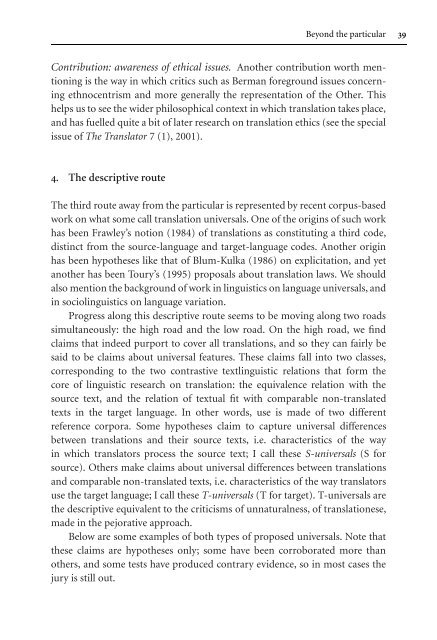Translation Universals.pdf - ymerleksi - home
Translation Universals.pdf - ymerleksi - home
Translation Universals.pdf - ymerleksi - home
You also want an ePaper? Increase the reach of your titles
YUMPU automatically turns print PDFs into web optimized ePapers that Google loves.
Beyond the particular 39<br />
Contribution: awareness of ethical issues. Another contribution worth mentioning<br />
is the way in which critics such as Berman foreground issues concerning<br />
ethnocentrism and more generally the representation of the Other. This<br />
helps us to see the wider philosophical context in which translation takes place,<br />
and has fuelled quite a bit of later research on translation ethics (see the special<br />
issue of The Translator 7 (1), 2001).<br />
4. The descriptive route<br />
The third route away from the particular is represented by recent corpus-based<br />
work on what some call translation universals. One of the origins of such work<br />
has been Frawley’s notion (1984) of translations as constituting a third code,<br />
distinct from the source-language and target-language codes. Another origin<br />
has been hypotheses like that of Blum-Kulka (1986) on explicitation, and yet<br />
another has been Toury’s (1995) proposals about translation laws. We should<br />
also mention the background of work in linguistics on language universals, and<br />
in sociolinguistics on language variation.<br />
Progress along this descriptive route seems to be moving along two roads<br />
simultaneously: the high road and the low road. On the high road, we find<br />
claims that indeed purport to cover all translations, and so they can fairly be<br />
said to be claims about universal features. These claims fall into two classes,<br />
corresponding to the two contrastive textlinguistic relations that form the<br />
core of linguistic research on translation: the equivalence relation with the<br />
source text, and the relation of textual fit with comparable non-translated<br />
texts in the target language. In other words, use is made of two different<br />
reference corpora. Some hypotheses claim to capture universal differences<br />
between translations and their source texts, i.e. characteristics of the way<br />
in which translators process the source text; I call these S-universals (S for<br />
source). Others make claims about universal differences between translations<br />
and comparable non-translated texts, i.e. characteristics of the way translators<br />
use the target language; I call these T-universals (T for target). T-universals are<br />
the descriptive equivalent to the criticisms of unnaturalness, of translationese,<br />
made in the pejorative approach.<br />
Below are some examples of both types of proposed universals. Note that<br />
these claims are hypotheses only; some have been corroborated more than<br />
others, and some tests have produced contrary evidence, so in most cases the<br />
jury is still out.
















